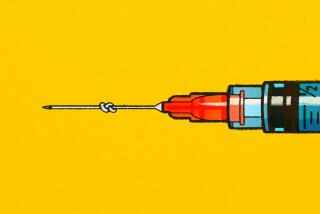Slaves to the Scalpel : Plastic Surgeons Have Discovered a Disturbing Syndrome in Which an Obsession With Appearances Can Keep Some Women Coming Back to the Operating Room
- Share via
In March, 1986, a 33-year-old Los Angeles woman had rhinoplasty, commonly called a nose job. She was pleased with the results--so pleased, in fact, that in June she had liposuction, a surgical procedure to remove excess body fat. In October, she had breast-reduction surgery. Two months later she asked her doctor to augment her new, smaller breasts. But the surgeon turned her down and suggested instead that she consult a psychiatrist.
About the same time, another Los Angeles woman, who had had an eye lift, a face lift, a chemical peel and collagen implants (to smooth a pockmarked complexion), a breast lift and rhinoplasty before she turned 40, urged her 17-year-old daughter to get a nose job and liposuction. But the girl didn’t appear to need or want the surgery. Their doctor refused to operate and recommended counseling for the mother.
Both women could be called scalpel slaves. Doctors first began noticing the syndrome in Los Angeles, New York City and Miami. The problem has since surfaced in Chicago, Dallas and other areas where incomes are high. It is an emotional addiction to plastic surgery, characterized by an obsession with appearance that leads from one operating room to another.
In the late ‘70s, the public first became aware of anorexia nervosa and bulimia, afflictions associated with the pursuit of physical “perfection.” Now that quest is leading to the operating table.
Like these eating disorders, obsessive dependency on cosmetic surgery most often occurs among women, according to Dr. Richard Ellenbogen, a Los Angeles cosmetic surgeon. “They get an emotional lift from the first surgery,” he says. “They think that subsequent procedures will result in the same high. They want to improve their lives, not just their appearance. It doesn’t work that way.”
Ellenbogen says that even doctors with many years of experience don’t always recognize an emotional problem behind the desire for cosmetic surgery. “I start recognizing danger signals when the patient comes back a third time requesting another procedure. Unfortunately, when a doctor says no and suggests psychiatric help, the obsessed patient usually rejects the advice and finds another doctor who will perform the surgery.”
But Ellenbogen is quick to point out that not everyone who wants three or more operations is a slave to the scalpel. “Most people have a very realistic understanding of what they can achieve,” he says. “They want to change something that has bothered them. On the other hand, the disturbed personality is grasping at straws, trying to fix a social or emotional problem by changing her nose or enlarging her breasts.”
Emotionally unstable patients--the ones who are most likely to desire endless surgeries--also get the least satisfaction, says Dr. George H. Sanders, an Encino-based plastic and reconstructive surgeon. “How can someone be pleased if they expect that the cosmetic surgery will lead to a new job or a new boyfriend? It won’t. Yet numerous women have those kinds of expectations.”
Dr. Susan Chobanian, a Beverly Hills rhinoplasty specialist, adds: “This is the type of personality who will undergo surgeries that are totally unnecessary. This type of woman is constantly scrutinizing herself, so she becomes extremely self-critical. She begins to see problems that don’t exist.”
Dr. Marcia Kraft Goin, a clinical professor of psychiatry at USC School of Medicine, explains that there are healthy motivations for multiple surgeries. “If the patients are unhappy with sagging facial skin or small breasts or fat thighs-- and they want a result that is possible--that’s normal. But if they think that their lives will change dramatically, they won’t be satisfied.”
According to Dr. Ronald Iverson, assistant clinical professor of plastic surgery at Stanford University Medical School, multiple cosmetic surgeries are not in themselves dangerous. It’s the emotional risk that is high, he says. In most cases, the scalpel slaves don’t realize they’re hooked. “It’s up to the doctor to say no to unreasonable requests,” he says.
Makeup by Michelle Buhler / A la Mode; model: Kim Campbell / East / West.






